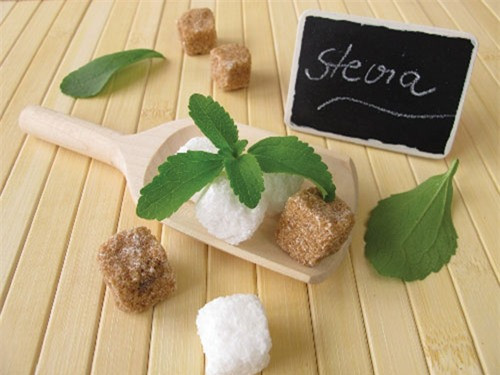Stevia: Medicine or Supplement?
“Stevia is not a medicine,” Associate Professor, Dr. Huynh Ngoc Thuy, Department of Medicinal Materials, University of Medicine and Pharmacy, Ho Chi Minh City, affirmed. However, in the market, stevia is introduced and sold as a medicinal material.
 |
Full range of preparations
The most popular product of stevia is dried stevia, also known as stevia tea, which is sold in most traditional medicine pharmacies, especially in District 5, Ho Chi Minh City. At Vinh Thanh pharmacy (District 5, Ho Chi Minh City), stevia is sold in the form of dried whole leaves to make drinking water for 85,000 VND/kg. The seller said that this year the product is scarce so it is more expensive, compared to last year when it was only 50,000 VND/kg.
According to the seller's instructions, "just wash it, boil it a little and you can drink it" (!?). The price of stevia tea varies quite a bit, depending on the place. Bao Khang Pharmacy (Nguyen Hong Dao, Tan Binh District, Ho Chi Minh City) quotes a price of over 100,000 VND/kg; some online stores offer prices of up to 120,000 VND/kg... Trung Tam Oriental Medicine Pharmacy (District 5, Ho Chi Minh City) sells it in filter bags, 45,000 VND/box. The seller said: "It's good for diabetics to drink because the sugar content of stevia is lower than other types (?). People who are not sick can also drink it because it helps cool and detoxify."
Not only that, many sites such as Caythuoc.org, thaoduocviet.vn... also sell stevia tea as a panacea: helps regulate blood sugar, diuretic, anti-obesity and weight loss; is a tonic that helps fight stomach disorders, relieves pain and improves digestion; prevents bleeding gums in people with gingivitis because it contains strong antibacterial properties; prevents acne, reduces sebum secretion, anti-inflammatory to help keep skin smooth and radiant; helps reduce wrinkles and brightens...
Recently, the market has seen the appearance of stevia extract products produced in Vietnam or imported in many forms: liquid, tablets... Stevia sugar is sold at quite high prices: liquid form from 28,000-30,000 VND/10ml; tablets: 36,000 VND/25g. The product packaging clearly states: "Sugar used to replace sugar in food, suitable for everyone; especially a flavoring agent for people with diabetes and at risk of obesity". The manufacturer also instructs that it should be used when drinking with coffee or tea.
 |
| Stevia leaves and stevia sugar extract |
Should only be used as a dietary supplement.
Stevia rebaudiana was introduced to Vietnam in the early 1980s. The main ingredient that gives the plant its sweetness is stevioside, which is about 300 times sweeter than sucrose (cane sugar). Associate Professor, Dr. Huynh Ngoc Thuy (who conducted a research project on stevia) said: Because it tastes very sweet but does not create energy, stevia sugar is used to replace regular sugar, suitable for dieters and obese people; another advantage of stevia is that it can satisfy diabetics' sweet cravings without increasing their blood sugar.
Many countries in South America such as Brazil, Columbia, Paraguay, Uruguay... use stevia as a food supplement, replacing sugar. In Asia, especially China, Japan, and Korea, stevia is used as a sugar substitute for people on a diet, with diabetes or obesity.
However, Associate Professor, Dr. Huynh Ngoc Thuy emphasized: Stevia is not a medicine, so far people have only used sugar extracted from stevia as a food supplement. The US Food and Drug Administration (FDA) also only allows its use as a food substitute. Stevioside extracted from stevia will not increase blood sugar in diabetics like regular sugar, but there is also no evidence of stevia's effect of lowering blood sugar in diabetics.
The European Commission recommends that stevia should only be used at a maximum daily dose of 4 mg/kg body weight.
According to the FDA, some studies have shown that using raw leaves has adverse effects on reproduction, cardiovascular, and kidney health. Epidemiologically, it has been found that some areas where raw stevia leaves are grown and consumed a lot often have very low fertility rates.
Another thing to note is that stevia is susceptible to pests and diseases, so pesticides must be used regularly when growing it. Therefore, if the process of minimizing pesticide residues is not properly ensured, stevia can cause many health hazards.
According to Alobacsi.






